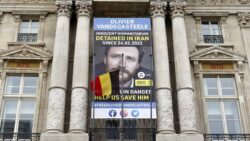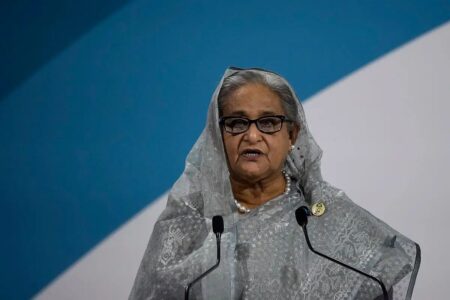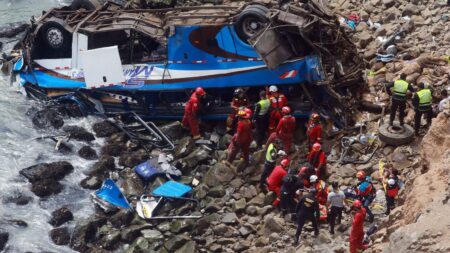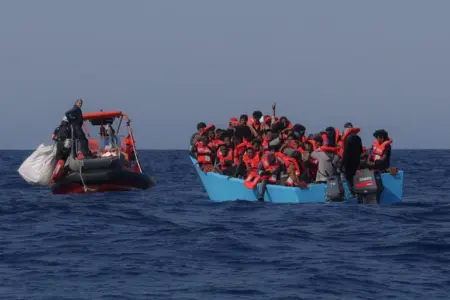Olivier Vandecasteele was imprisoned in Tehran last February on charges of espionage.
Olivier Vandecasteele was imprisoned in Tehran last February on charges of espionage.
The health of a Belgian humanitarian aid worker jailed in Iran is deteriorating, according to his best friend.
Olivier Vandecasteele was imprisoned in Tehran last February on the eve of his return home and sentenced to 40 years in jail with 74 lashes.
But after nearly one year in solitary confinement his closest friend Olivier Van Steirtegem – who has been helping in the fight for his release – says his condition is not good.
“The situation is extremely difficult,” Van Steirtegem told Euronews.
“The food is very bad, so he lost already 25 kilos. He doesn’t see anyone because he can’t go out of his cell. He lost the nails of his toes. He has gastric issues, mental issues, and dental issues. So, Olivier is kind of desperate.
“I would say Olivier doesn’t see things moving, obviously, because the people that have him, tell him ‘nobody is thinking about you. Your embassy doesn’t want to see you. Your family is not thinking about you’. And that’s obviously troubling in his mind.”
Van Steirtegem added that Belgian authorities should follow the example of the US government when it comes to negotiating prisoner exchanges.
“It’s impossible as a relative or as a close friend of Olivier not to think about the situation of similar hostages in Iran and what these countries do in order to free up their own citizens,” he said.
“I take a simple example – the United States of America. When they had this basketball player [Brittney Griner] arrested in Russia – they did not hesitate to free up a weapons trafficker, Viktor Bout, who was sentenced to 25 years in jail, to free up this person in order to get the return of their own citizen.
“And that’s a positive thing because that means that democracy doesn’t let authoritarian regimes do whatever they want. They consider that the life of their own citizen is more important than whatever the person they would have here in jail.
“We [Belgium] need to be more self-assured, I would say, on the fact that the life of a human being is the most important thing on Earth – full-stop.”
Hostage diplomacy
For many observers, Vandecasteele is caught up in a high-stakes game of geopolitical hostage diplomacy.
Iran originally wanted to swap him for an Iranian diplomat called Assadollah Assadi who is convicted of terrorism in Belgium.
But a Belgian court suspended a transfer treaty between Brussels and Tehran, which was agreed in July, fearing Assadi will escape punishment in Iran.
This means that, for now, Vandecasteele is stuck in the middle of diplomatic negotiations, with the Iranian government so far only willing to do a like-for-like exchange.
Belgium’s Supreme court must decide by March if the swap can go ahead under the terms of this transfer treaty.
Amnesty International’s director in Belgium, Philippe Hensmans, says the government should already be working on other solutions should the prisoner swap fails.
“What’s more dangerous is to get the Belgian government thinking only about this solution to get Olivier released. It’s extremely important to find all these other solutions rather than [just] this one, because if the Court of Cassation [Supreme Court] says no, well, what shall we do then?” Hensmans told Euronews.
“So, I hope that there are diplomatic discussions – we don’t know what’s being discussed – but that the Belgian government is looking for other solutions to get them released.”
A time to be ‘courageous’
A petition in Belgium calling for the release of Olivier has already reached 200,000 signatures.
Hensmans added that this should give the Belgian government even more reason to be brave in its decision-making when it comes to Vandecasteele’s case.
“I think what’s important is to measure how much Belgian people are pushing to get him released and pushing the Belgian government to do everything they can to get him released,” Hensmans said.
“We are reaching 200,000 people who have signed the petition, which is enormous. That’s probably one of the biggest petitions we have had at Amnesty [in Belgium], for example. And they have to take that into account. So many people are asking that they [Belgian government] be courageous because they are supported by the Belgian population. So be courageous.”
Earlier this month, Belgian Justice Minister Vincent Van Quickenborne said the government will do everything it can within the bounds of the constitution to free Vandecasteele.
But as Belgium is waiting for the Supreme Court decision, it is not the only country locked in battle with Iran.
On Sunday, a demonstration was held in Paris calling for the release of seven French citizens held in Iranian prisons on trumped-up charges, including espionage.
There are other countries too, as Tehran increasingly uses the tactic against the West, as its own diplomatic leverage wanes, following years of crippling economic sanctions.
It’s why Amnesty International says countries suffering from the same problem need to start working together to neutralise Iran’s efforts at geopolitical hostage-taking.





